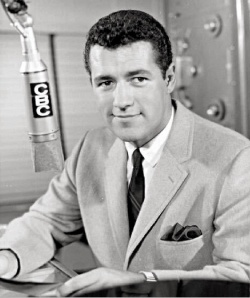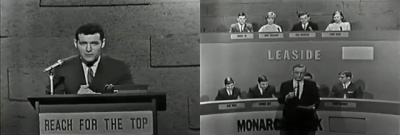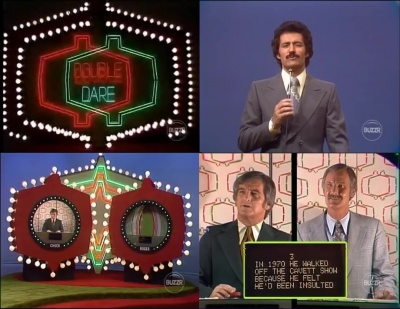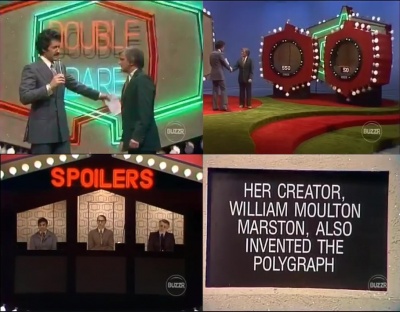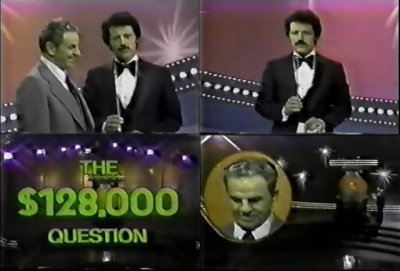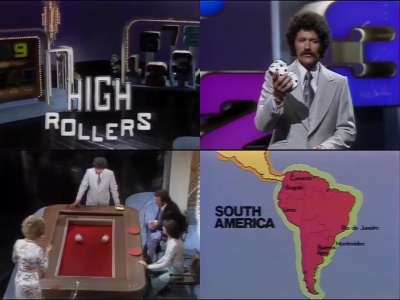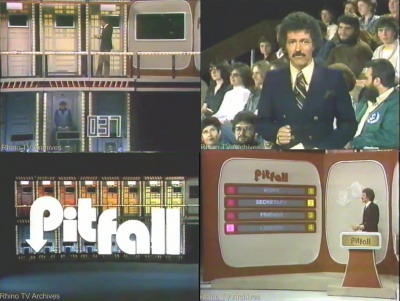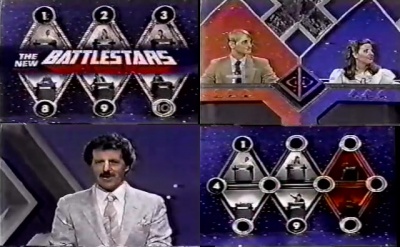Weaver's Week 2019-07-14
Last week | Weaver's Week Index | Next week
Greetings from Blackport! The Week is having a summer pause, so here's the latest in our occasional series of Living Legends.
Contents |
Alex Trebek
George Alexander Trebek was born on 22 July 1940 in Sudbury, Ontario. He was brought up speaking English and French, attended the Oblates of Mary Immaculate boarding school in Ottawa, then read philosophy at the University of Ottawa. As a student, he worked in CBC Radio to help pay his tuition.
After graduation, Alex was taken on as staff by the CBC, giving news reports on television and radio. Transferring to the national broadcast centre in Toronto, he became known as a cool master of ceremonies. He hosted a variety of live events and shows, including pop music programme Music Hop (1963-4), and high school quiz Reach For the Top (1966-73). Challenge matches between Reach For the Top and the BBC's Television Top of the Form gave Alex his presenting credit over here.
Lured south of the border, Alex hosted NBC's game show The Wizard of Odds (1973-4), CBS's Double Dare (1976-7), The $128,000 Question (1977-8), and back to NBC for The New High Rollers (1979-80). Then there was Pitfall (1981), Battlestars (1981-2), and pilots of video game game show Starcade (1982) and a show called Malcolm (1983).
Whoa! Whoa! So many shows to review, and we're only three paragraphs into the man's life!
Music Hop was a general entertainment show, and not a game, and there are enough commissioned shows that we can ignore the pilots. So let's take these in order. What do we learn about Alex Trebek from...
Reach for the Top
The format is fairly simple. We've a buzzer quiz, with questions sorted into sets of four on related topics. Most sets are entirely on the buzzers, occasionally there's a "scramble" question, where only the team giving the correct answer can buzz in on the subsequent questions.
There are some variations on the theme: head-to-head rounds between the players sat directly above each other, assigned questions to each player, and difficult questions on which the teams could confer.
Each province of Canada had its own tournament amongst high schools, with the winners progressing to the national finals. There was some latitude so each province could make its own show – we've seen an episode from British Columbia where each player is expected to argue for or against a topic of contemporary interest, and marked on their debating skills.
Reach for the Top came from the same gene pool as College Bowl. We can tell this from the seating arrangements: teams of four, literally sat in rows one above the other. The questions are easier than those aimed at university students, for obvious reasons. All are straightforward questions – there's none of the round-the-houses waffle and overly-extended clues that have become the hallmark of University Challenge here.
What do we learn about Alex Trebek from this show? Even in the 1960s, he came across as unflappable, and always had an encouraging word to say without once being patronising.
On this side of the pond, schoolchildren were tested in Top of the Form, a radio and television entertainment that mixed general knowledge questions with listening comprehension and specialised subjects. The CBC and BBC series met in Trans-World Top Team: twelve students from Toronto, Montréal, and Ottawa came to London, and twelve students from this side of the pond played games in Canada. Hosts for the shows were Geoffrey Wheeler and Alex Trebek, and this is the prime reason why we claim Alex as on-topic.
Wizard of Odds
We've not found any video for Wizard of Odds. From written descriptions, it sounds a bit of an acquired taste. Contestants were picked from the audience, to answer questions with numerical answers. The aim was to pick the lowest amounts without going over a target.
The show had a bonus round, "Wizard's Wheel of Fortune". At the end of the show, Trebek spun a giant wheel showing the six contestants who played that day. The chosen contestant was given a list of items, and was to pick the averages to match a target number. Success earned a brand new car. Sounds far too complicated, even for the early 1970s.
Double Dare
Nothing to do with Peter Simon and buckets of BBC soup, this was another Mark Goodson production for CBS. We saw an episode from just before Christmas 1976, billed as episode 10.
Two contestants were put into soundproof booths. Alex Trebek read a series of "what am I" clues, statements leading to a common answer with pauses between. When one player buzzed in to guess the answer, the other player's booth was closed off. And we mean literally closed off: a pair of curtains shielded their view of the studio.
Let us suppose the player who buzzed in got it right. A correct answer was worth $50 and allowed the player to Dare their opponent to guess the answer with the next clue. Opponent gets it right? They pilfer the $50, otherwise the darer pockets $100. And if the dared player missed, the darer could "Double Dare" with one more clue for $200.
The first player to score $500 played the Bonus Round against "The Spoilers", three men with doctorates in different disciplines. The contestant was shown a subject and tried to stump The Spoilers by choosing four clues from a pool of eight – the player would see the clue and could ditch it, but could only ditch four clues. Each time a Spoiler didn't guess the answer, the contestant received $100, and there's a $5000 jackpot if at least one Spoiler remained stumped after the fourth clue.
What do we learn about Alex Trebek? He makes a complicated format look easy. That final round is a nightmare to describe using words; watch it just once, and we know exactly what is going on. He also has authority, and just the barest hint that he might have written all of these clues himself.
The colours on this show are clearly from the 1970s: green and pink neon signs, striped curtains that open and close when contestants are in and out of play. The bonus round features wooden doors that drop with a resounding "thunk!". In this format, it's a fairly quick game – each episode would have one or two bonus rounds. Alex is on top of the format, knows what can happen next, injects a little personality into the show. And he puts in some tension, particularly when the final round heads towards a jackpot.
The $128,000 Question
The $64,000 Question played for post-inflation stakes. Questions are on a subject nominated by the contestant. It all starts very easy for low stakes, and gets progressively more difficult as the cash goes up. Eventually, the contestant is put into an isolation booth to heighten the tension, while ascending scales play to ramp up the doubt even further.
Here, we see Alex Trebek at home with some difficult subjects. He can talk with confidence about World War I and Modern Television and Horse Racing, and perhaps talk with knowledge drawn from his own research. Even when a contestant picks up some sloppy research, Alex can explain what's going on and remain completely in control of events.
High Rollers
A Merrill Heatter-Bob Quigley production, and it's basically a quiz version of the traditional pub game "Shut the Box". Two contestants buzz in and try to answer general knowledge questions – if they're both stumped, Alex will end the question by giving two possible answers.
Whoever gets control of the game (and control can be passed) rolls a large pair of dice. The numbers they roll equate to digits on a game board, and behind each digit is a prize. Roll an 8? You can remove the 8, or any combination of numbers that add up to 8 – so 3 and 5, or 1, 3, 4 are both valid. The largest prize on the board – a foreign vacation or a brand new car – would be split in halves, and both needed to be claimed by the same player to be won.
To keep the prizes, a player had to remove the last of the nine numbers. Or they could see their opponent roll a number that couldn't be removed from the board. To make it even more complex, doubles earn an "insurance marker" – a lifeline to remain in the game if they cannot play. Again, complicated when it's written down, easy when Alex explains it.
The winner of a best-of-three match becomes the champion, and goes on to play the Big Numbers, for cash prizes and a potential $10,000 jackpot if they clear the board.
While it looks simple, High Rollers is a complex game. At the fast pace on screen, the viewer can't do everything. We can try to play along, we can try to appreciate the contestants, we can absorb the host's effort, but not all three at the same time. And that would become Alex's calling card: he is the ever-present, unruffled, lets the players and the game be the star while impressing us subliminally.
Pitfall
The show with live computer voting! As we go through the show, the audience is asked a bunch of questions, with four possible answers. They vote, live, and the most popular answer is locked in. Two contestants will take a guess at which is the single most popular answer. Each right answer earns points, and the game is won with five correct answers. Most rounds end after five minutes – about seven questions – because no-one's reached the target.
In 2019, we're completely blasé about live voting in the studio. In 1981, this was a gimmick, a selling point, something unique. But it wasn't the star of the show.
The star was a path across the top of the studio, eight platforms wide plus stairs at the sides. Our champion aimed to get across from one side to the other, to win a prize package – a car or a holiday or something like that. Each time they answered a trivia question correctly, the winner moves on to the next platform and earns C$100.
But not all of these platforms are stable. Three of the eight are pitfalls, they will descend when the contestant steps on them. To move on, the contestant will have to answer one question to come back up, and another question to move on. Worse, the clock will continue running while the platform descends, taking about 7 seconds from the limited 100 seconds.
But our player can avoid this horrible fate by using "Pit passes" – one for answering a question correctly in the main game, another for scoring 3 correct answers, another for completing the sweep of 5 right. Even better, the contestant will be told which are the Pitfalls, their numbers will flash twice in a seemingly-random sequence, all the safe ones will flash just the once. Having seen the flashing numbers, the player decides at once where to use their passes.
It's a very high-concept game, described itself as "the most lavish game show set ever created", and at the cutting edge of technology (computer scoring! Platforms that go up and down!) The main game had very little to do with the bonus game, suggestive questions and plain trivia never quite gel.
Pitfall did give Alex a chance to host a more relaxed show, and one where he shows that he's able to work as easily with emotions as with intellect. The show is full of humorous asides, it proves that Alex isn't just a trivia buff but a well-rounded human. He was never paid for the work – Catalena Productions went bankrupt, many contestants never received their prizes, and the host's cheque bounced.
Battlestars
Suspiciously like Hollywood Squares, and if it had come from any company other than the Hollywood Squares producers, we reckon there would have been lawsuits.
Six celebrities sit in triangular boxes, outlined by corners numbered 1 to 10. Three corners around each celebrity, because that's what triangles do. One of the numbers is picked at random, and the contender picks which of the celebs whose triangle has a corner at that number – that celeb will be asked the question. It's a difficult general knowledge question, and while the celebrity sees two possible answers, the contestant only hears the one the celeb chose. Do you agree with the celebrity?
Right to agree? Excellent, you keep control of the game and strike that number off the board. Wrong to agree? Hard lines, your opponent will get a random pick of corners, and that number will come off the board unless it would hand someone a celebrity.
Win the third corner around a player and that star is yours. Doesn't matter if your opponent won the other two vertices, it's completing the triangle that counts. First contestant to capture three stars wins the game and plays the bonus game. US$500 for the first two correct answers, a trip or car and white goods for matching all three. Questions in the bonus game have three possible answers, and the player is to provide the right answer – with or without the celeb's help.
Battlestars is a complex and faffy game, one that even the greatest talents would struggle to leaven. Alex was helped by an array of C-list celebs, eager to entertain on daytime telly, but smart enough to know that the game needs to progress faster than their career. From this show, we learn that Alex Trebek is a great host, but even he can't work miracles.
By 1984, Alex Trebek had demonstrated he was a versatile host. He was best at fast-moving trivia, and at home in academics. He could do the celebrity panel show, and he was great at making complicated formats feel easier. We return next week to complete this appreciation of Alex Trebek in single, double, and triple hosting.
This Week and Next
Congratulations to Los Lobos. The resident champions of TVE's Boom! show finally won the jackpot after more than two years, answering fifteen difficult general knowledge questions on the spin. Their final prize was more than €6 million. It is not known if the team celebrated by dancing The Goat.
ITV2 has commissioned 20 episodes of Supermarket Sweep, to be hosted by Rylan Clark-Neal. By going out on The Deuce, it'll be an hour long. ITV2 also say it's going out before the watershed: we reckon either stripped at 6pm to take a lead-in from The Chase, or 8pm once a week like Comedy Central do with Blockbusters.
To no-one's surprise, BBC2 has commissioned two more series of Race Across the World. One run will reprise the trek from London to Singapore, but split over eight legs. The second route has yet to be confirmed.
Radio 4's Brain concluded its run of semi-finals in a traditional way, with programme 4. And it begins with a traditional quiz catch question: the first ghost to visit Scrooge in A Christmas Carol. That doesn't trip Gareth Aubrey, and he opens up a small lead at the end of the second round. He picks up a slip when Steve Goddard says "The Scout's Handbook", when the right answer is "Scouting for Boys".
Gary Grant didn't do very much in the first half of the show, but springs to life in round four, with the first 3-in-a-row of the edition. Alice Walker has been picking up bonuses, and gets a three of her own. Not a single starter question is answered correctly in round five, and only the one in the final round, so the show ends on a bit of a damp squib. Gareth Aubrey's steady start gives him the win, 12 points puts him clear of the others on 8, 7, and 6.
BARB ratings in the week to 30 June.
- Coronation Street remains the top show (ITV, Mon, 7.1m). Love Island is still the leading game (ITV2, Sun, 4.3m), but that's down almost a million from last week's peak.
- The Voice Kids (ITV, Sat, 3.15m) and The Chase (ITV, Tue, 3.05m) complete a clean sweep for the favourite buttons. BBC1's biggest was The Hit List (Sat, 2.2m).
- Mock the Week was BBC2's biggest game (Thu, 1.45m), but Dara ran himself close – The Family Brain Games had 1.4m (Tue).
- Taskmaster (Dave, Wed, 1.15m) proved more popular than The Crystal Maze (C4, Fri, 960,000). Channel 4's purchase Portrait Artist of the Year brought 485,000 to Saturday teatime. And a great score for Breaking the News (BBC Scotland, Sun, 72,000).
Are we done with the sport? By Sunday night, we will be, so let's have some fabulous new shows.
A new run of The £100k Drop (C4, weekdays)? That'll be marvellous. Best House in Town (BBC2, weekdays) will find an audience. University Challenge (BBC2, Mon) makes a lot of people happy.
Photo credits: CBC, Goodson-Todman, Cinelar, Century Towers / Merrill-Heatter, Catalena .
To have Weaver's Week emailed to you on publication day, receive our exclusive TV roundup of the game shows in the week ahead, and chat to other ukgameshows.com readers, sign up to our Yahoo! Group.

